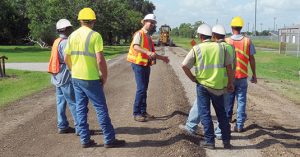By William Lowery, P.E.
Texas A&M Engineering
Extension Service
 The Lone Star LTAP Center at the Texas A&M Engineering Extension Service (TEEX) is offering new and important training in the ongoing effort to help local agencies improve their roadways.
The Lone Star LTAP Center at the Texas A&M Engineering Extension Service (TEEX) is offering new and important training in the ongoing effort to help local agencies improve their roadways.
For many jurisdictions, the motor grader is one of the most commonly used pieces of equipment. Best practices suggest that many operators could benefit from having more knowledge about the fine points of using this very expensive and highly versatile machine.
Expensive Machines Warrant Well-Qualified Operators
Does our investment in training operators track with our investment in road work equipment? Motor graders can be used to accomplish many things, if in the hands of a highly skilled operator. However, if operator skills are low, a good deal of the investment in the machine may not be tapped. According to very experienced equipment operators, the motor grader is probably the most difficult machine to learn how to use at its best advantage. Clearly, more skill and experience are required to effectively use a motor grader than for most other pieces of heavy equipment, cranes being a notable exception.
Things Operators Need to Know
In addition to knowing how to make a motor grader work properly, an operator must have a good understanding of what is needed to make a roadway as effective as it can be with available resources. The operator needs knowledge of best practices in roadway features. Some of the more important of these are noted in the box at the bottom of the opposite page. For example, an operator needs to know how much road crown is enough, and how much is too much; how to make a grader cut and mix road materials as he works, not simply push materials down the road; and how to maintain the best speed of operation.
Plan for Motor Grader Schools
LTAP will bring the Motor Grader School to your county and will utilize three training components:
Classroom Training In a suitable classroom provided by a host agency, important safety and basic motor grader features and characteristics will be presented. Roadway topics as mentioned in the box, and other similar ones, will be discussed in considerable detail. The focus will largely be on how to use a motor grader to the highest and best advantage for such features. Unpaved roads will be the main topic, but use of motor graders on paved roads will also be discussed.
Field Training Following the classroom portion, field exercises will be on roadways pre-selected by the host agency or by neighboring jurisdictions. Using an adequately safe grader furnished by the jurisdiction, the instructor will demonstrate many of the techniques discussed in class. Each participant will then have ample opportunity to practice the same techniques under the watchful eye of the instructor. The instructor will coach each participant on how to adjust the techniques to the assigned task.
Improvement of a Roadway One advantage of this instructional model is that at the conclusion of the field training exercises, the jurisdiction will have one or more sections of roadway maintained or improved. This dictates that the jurisdiction take responsibility for providing the necessary work zone traffic control setup, and a water truck if necessary.
Each school should take four or more days, but all participants need not be involved all of the days. For best results, a school must include 10 to 12 participants who will fully participate in the first day of classroom instruction. In the following days, groups of three to four participants who attended the classroom instruction will accompany the instructor for field training on a section of roadway. Each day the instructor will work with a different group on a different road (or different sections of the same road). With this arrangement no employee will need to be out of service more than two days. Each day’s objective is twofold: to improve the skills of the participants with plenty of coached operating time, and to leave behind a section of improved roadway. This offers the benefit of combining training with production, and provides on-the-job training, the best kind for learning equipment operation.
Success in Jefferson County
As of press time, LTAP had several Motor Grader Schools in the planning stages, with one already completed in Jefferson County, hosted by County Commissioner Brent Weaver. This school included some municipal employees as well as county personnel. The school was led by Tim Thompson, TEEX instructor, and Eldon McCurley, TEEX roadway maintenance specialist.
The school was “very informative…for our county staff and the city staff,” Weaver concluded.
Hosting a Motor Grader School at Your Location
To host, a jurisdiction must arrange for 10 to 12 participants who are committed to attend. In addition the jurisdiction will need to provide a suitable classroom; a safe and fully functional motor grader and the means to move it to two or more locations; two or more on-road work sites suitable for class field operations; suitable work zone traffic control for these roads on field training days; and an accompanying water truck as necessary in order to accomplish good road work.
Key Benefits
Employees will be able to perform more effective road maintenance.
Roads will function better when it comes to shedding water, and present better riding surfaces for longer periods of time.
Scarce maintenance dollars will be further stretched.
Any local government jurisdiction that would like to host a Motor Grader School should contact the Lone Star LTAP Center at TEEX.
For More Information:
800-SAFE-811
(800-723-3811)
Fax: 979-458-1426
www.teex.org/ltap
itsi@teex.tamu.edu















